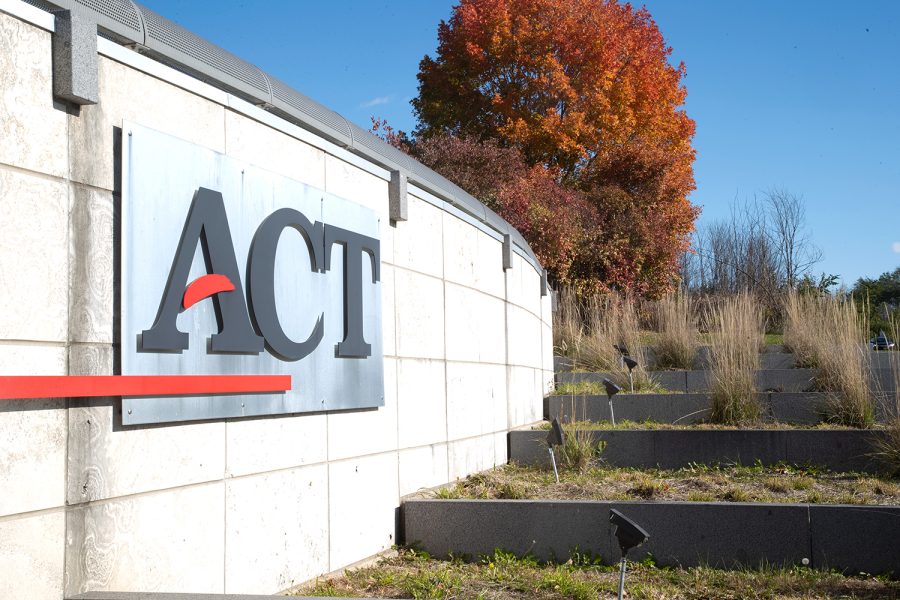ACT receives Climate Action at Work Award
ACT won a Climate Action at Work award from Iowa City for their list of sustainability projects, which include wildlife management and protection, reduction in energy consumption, and landfill divergence.
The ACT building sign is seen on November 2 2021.
November 3, 2021
ACT’s Iowa City location received a Climate Action at Work award from the city for its work in resource conservation, wildlife management, and sustainability on its campus.
Iowa City Climate Action and Outreach Coordinator Sarah Gardner said the Climate Action at Work Award was created to recognize businesses, like ACT, who are helping the community move forward on the city’s climate action goals.
Senior Manager for ACT Cindy Barnett said the company has worked on climate-consciousness with the company’s property for the past 10 years. The company started working to be climate-conscious by applying to be an Audubon Cooperative Sanctuary member, she said.
The Audubon Cooperative Sanctuary website is an international organization that provides businesses a framework to become environmentally conscious in business operations.
Barnett said that by following the organization’s frameworks, ACT has managed to create a successful corporate sustainability policy.
“It was like a jumping in point for our commitment to reducing the impacts that our operations have on the environment,” she said.
ACT started its sustainability policy in 2012 by installing bat houses across its 400 acres of company-owned land, she said. The 400 acres consists of forestry, native prairie, agriculture, and campus buildings.
In 2013, ACT installed three electric vehicle charging stations for their employees to use for free. The charging stations are now on a national registry, Barnett said, which means the public can use the charging stations free of charge, as well.
Barnett said ACT implemented other improvements to the campus, such as installing LED lighting in all buildings, installing solar panels that generate light for the parking lots, and implementing a building automation system that provides significant energy consumption reduction.
“We cut our consumption significantly,” Barnett said. “It was around a 50 percent reduction in energy consumption.”
ACT has also done significant projects in wildlife management on the company’s property, like planting milkweed to provide food for at-risk populations of monarch butterflies. In the fall of 2019, ACT harvested the milkweed – removing the seed and created milkweed balls.
Employees were able to disperse the milkweed anywhere on the campus or take the seeds home and throw them on their land, she said.
RELATED: Iowa City looks to create climate conversations with new ambassadors program
Barnett said a few years ago, a doe dropped two fawns outside of the conference room window for everyone to see.
“We did some education around that, letting people know how these animals care for their young and to please respect them,” Barnett said. “It was really fun to be able to do that.”
Another aspect of ACT’s corporate sustainability goals is recycling projects and landfill divergence, Barnett said. The test booklets are created with a material that can be repurposed and used to create drywall, she said.
According to an ACT report, the company has diverted more than 2,500 tons of recyclable waste.
“A cool fun fact is that we no longer have trash bins in our offices, we only have recycle bins,” Barnett said. “When we got rid of the trash bins, they were recycled into tackle boxes.”
Gardner said each winner of the Climate Action at Work Award receives $500 to use for future climate action initiatives.
Barnett said ACT will use that money for a spring 2022 project that involves wildlife management.
“I’m excited to share that we’re going to use our award to build bat houses, and we’ll be able to strategically place them in areas around campus that we know the bats will be safe,” she said.
Gardner said ACT was chosen for the adaptability award portion of the Climate Action at Work award because of the tremendous amount of work they have done to be climate conscious.
“We were really impressed by the many different levels on which they are working to improve their environmental impact,” Gardner said.
Barnett said while the company is committed to making a positive environmental impact, the success of their initiative wouldn’t have been possible without engagement.
“We wouldn’t have these successes without the engagement of the company and the people who work there,” she said.



